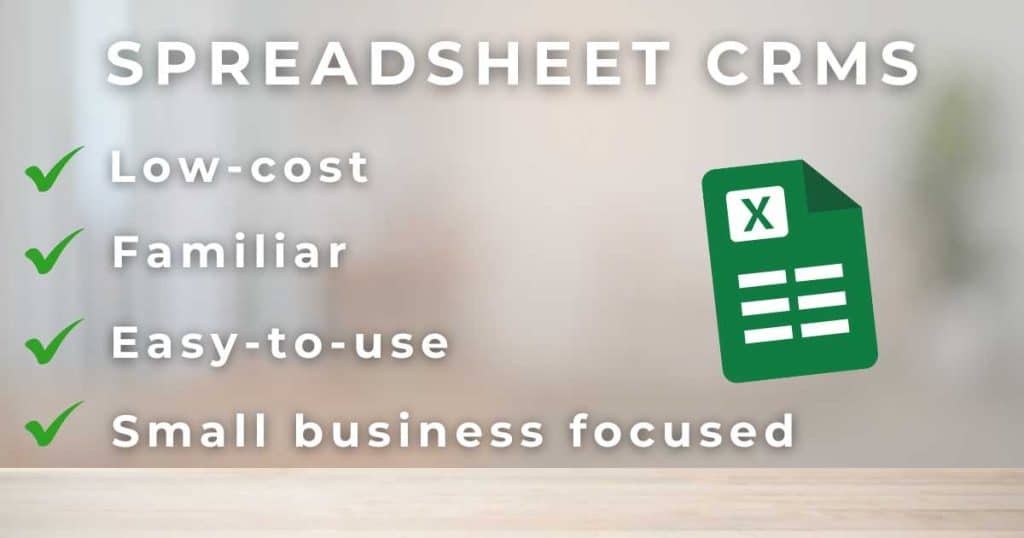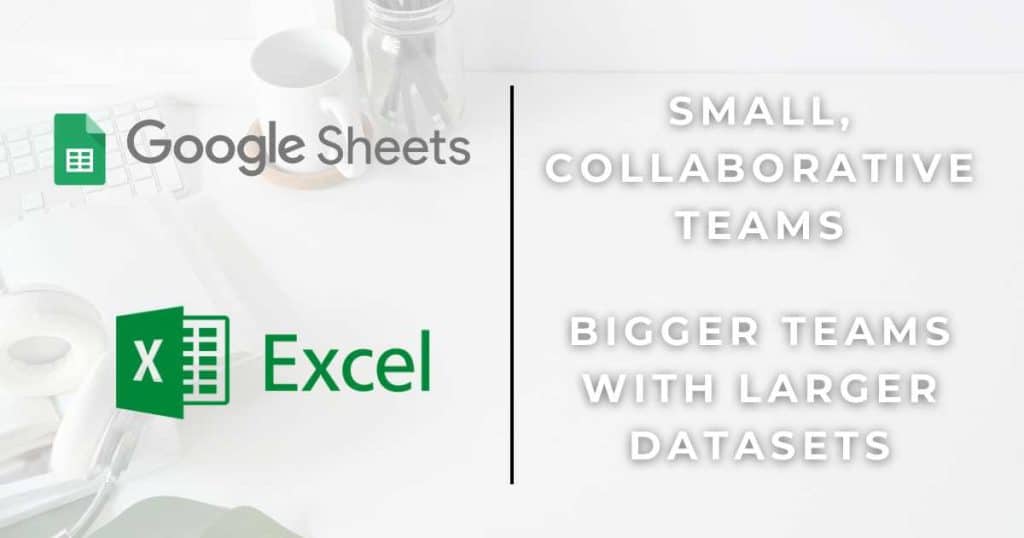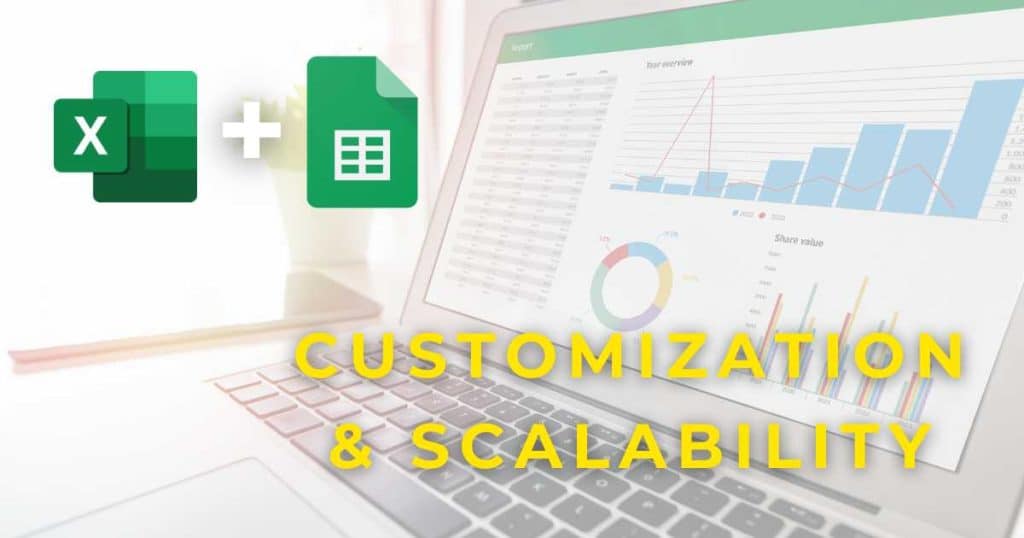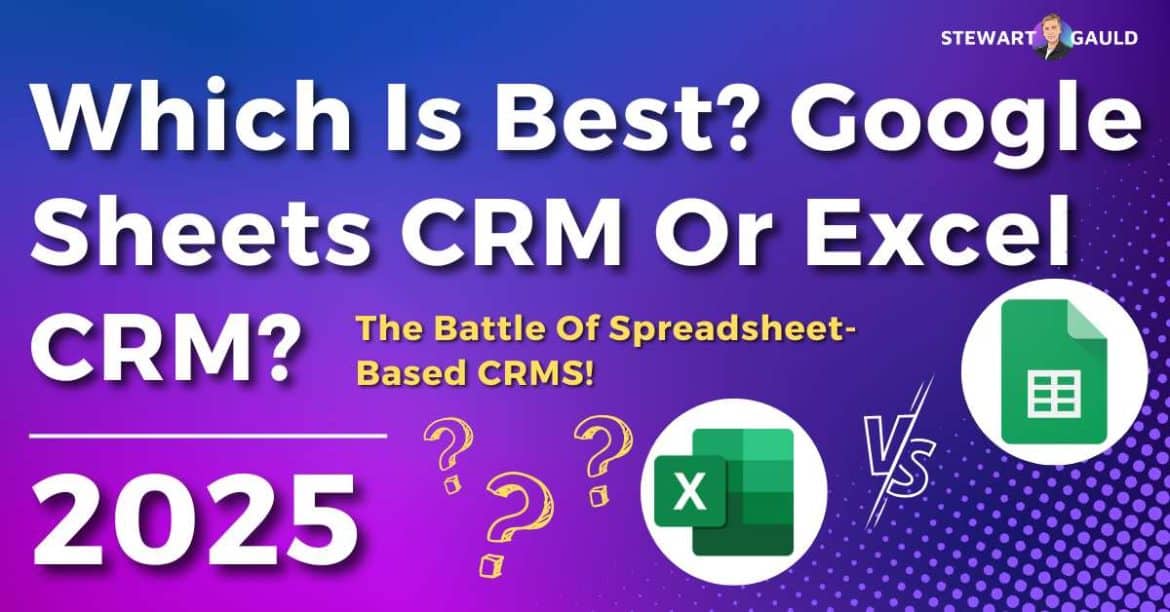Google Sheets CRM or Excel CRM? Which is the best spreadsheet-based CRM solution for your small business?
If you’re struggling to manage your customers, team, and sales, it sounds like you’re in need of an effective CRM system!
I talk a lot about dedicated CRM software and how convenient, user-friendly, and feature-rich they are.
But if you’re a small business owner who loves spreadsheets, you may wonder…..Can I use a spreadsheet to manage my customer-related tasks and activities?
And the answer is yes!
Both Google Sheets and Excel can be used as effective spreadsheet CRMs for small teams or micro businesses.
Read more: Can Google Sheets Be Used As a CRM?
Google Sheets CRM vs Excel CRM
While Google Sheets and Excel both serve as lightweight CRMs, they each have their strengths and weaknesses that impact how well they integrate into your business workflows.
From real-time collaboration to accessibility, advanced features, and ease of use, the choice between the two isn’t just about brand preference.
It’s about finding the best spreadsheet CRM that aligns with you and your team.
So, which one is better suited for your small business? Let’s take a look.
Why Use Spreadsheet CRMs?

Don’t get me wrong, dedicated CRM platforms are a robust and powerful choice for many businesses looking to manage their customers, contacts, and leads.
But for small teams, individuals, or micro-businesses just getting started, these systems can often feel overwhelming, expensive, or overly complex.
That’s where spreadsheet-based CRM solutions come in.
Tools like Google Sheets and Excel offer flexible, low-cost, and familiar alternatives that allow you to build a custom CRM without the learning curve or subscription fees attached!
For small businesses managing a modest number of leads or clients, a spreadsheet CRM can:
- Organize contacts.
- Track sales pipelines.
- Set reminders.
- Collaborate with your team.
Additionally, with various pre-made spreadsheet CRM templates available (such as Sheetify CRM), you can maintain complete control of your data and workflows without lifting a finger.
Read more: Best Free CRM For Google Sheets.
Google Sheets vs Excel CRM (Key Takeaways)

Google Sheets and Excel both pack a punch when it comes to managing and analyzing your customer data.
But choosing the right one as a CRM? That’s where things get tricky!
The choice between using Google Sheets and Excel as a CRM platform ultimately hinges on your business size, workflow, budget, needs, and more.
If you’re a small team or a growing startup that thrives on flexibility and real-time collaboration, Google Sheets might be your perfect match.
However, if you require more powerful tools for advanced data analysis or simply have a larger dataset, Excel may be a better fit.
Traditionally, Excel has the edge in terms of functionality, but with tools like Sheetify CRM, Google Sheets might just creep ahead into the number one spot!
Let’s break down how each stacks up now and which one could be the smarter move for you.
Read more: Best Google Sheets CRM Template.
Google Sheets CRM vs Excel CRM Pricing
Both spreadsheet tools offer similar flexible pricing structures, which is why they’re such attractive options for small teams seeking a cost-effective CRM solution.
Google Sheets is completely free to use with any Google Workspace account.
But if you’re looking for extras (more storage and advanced tools like Gemini AI), you must upgrade to a Google Workspace plan, which costs $7-$22 per user per month.
Excel also offers a completely free web-based version through Microsoft 365 (with limited functionality).
And like Google Sheets, you’ll need a Microsoft 365 subscription for complete access, which costs between $6 and $22 per user per month.
Additionally, you can purchase Excel outright as part of the Microsoft Office suite for a one-time fee of $149.
As both tools offer free plans and tiered pricing options with similar price points, this round is a draw!
Winner = Draw.
Read more: Manage Your Inventory With Google Sheets.
Google Sheets CRM vs Excel CRM Ease Of Use
The good news is that both Google Sheets and Excel are designed with user-friendliness in mind.
Additionally, there are plenty of Excel and Google Sheets CRM templates out there that can help you get up and running with your CRM system in no time.
These templates are readily available and designed to help you hit the ground running.
Many are free, easy to use, and designed specifically for small teams, meaning you can save time, stay organized, and focus on building great customer relationships effortlessly.
So, who wins this round? Well, Google Sheets has the cutting edge here, with its clean, minimalist interface that’s especially welcoming for beginners.
Google Sheets provides a clean, intuitive experience with no complicated setup, making it easy to head first in!
With that said, if you’re already familiar with the Microsoft Office suite, Excel may feel more familiar, thanks to its consistent design across Microsoft products.
Winner = Google Sheets CRM.
Google Sheets CRM vs Excel CRM Key Features

When it comes to core features and functionality, both Google Sheets and Excel offer more than enough for basic CRM tasks.
From built-in formulas, charts, data validation, and easy data manipulation, both tools have it all!
However, there are a couple of differences between the two spreadsheet-based CRM solutions.
For example, Google Sheets shines when it comes to collaboration and integrations.
It easily connects with other Google Workspace tools, and with the help of Apps Script or Google Workspace Marketplace, you can extend its capabilities even more.
Excel, on the other hand, is excellent for those who require more in-depth data analysis, advanced calculations, and richer visualizations.
It’s also highly customizable and integrates well with other Microsoft 365 apps and add-ons, allowing you to tailor it to your specific CRM needs.
For businesses that rely on complex reporting and in-depth analytics, Excel may be a stronger fit.
Unless you’re using Sheetify CRM, which brings Excel’s impressive functionality to Google Sheets in a simpler, more intuitive way!
Winner = Excel CRM.
Read more: Google Sheets Sales Tracker.
Google Sheets CRM vs Excel CRM Accessibility
As Google Sheets is a fully web-based tool within Google Workspace, remote access is a breeze!
Basically, you can work from anywhere in the world, as long as you have a solid Internet connection.
Even better, your entire team can collaborate on CRM activities in real time, with every change automatically saved for you.
This means you always have the most up-to-date information, ensuring you never miss a beat.
On the other hand, Excel offers both a desktop and a web-based version through its dynamic business suite, Microsoft 365, giving you the flexibility to work online or offline.
The downside? Real-time collaboration is only available in the web version. And even then, it’s not quite as smooth or intuitive as what Google Sheets brings to the table.
With that being said, Excel’s web version does offer essential features, such as auto-save and version history, which help teams stay on top of their tasks and deadlines at all times.
When it comes to managing CRM tasks effectively, real-time collaboration and accessibility are key, and that’s where Google Sheets clearly dominates!
Winner = Google Sheets CRM.
Google Sheets CRM vs Excel CRM Customization and Scalability

When it comes to customization, Google Sheets offers incredible flexibility, especially if you’re comfortable working with Google Apps Script.
From automating tasks to building custom workflows, the possibilities are nearly endless.
This makes it the perfect choice for those wanting to tailor their CRM exactly to their needs.
With that said, Google Sheets does have some limits, particularly when dealing with large or complex datasets.
For example, the performance can lag as your data grows, leading to issues over time.
Excel, on the other hand, is built for scalability and power.
With VBA scripting and the ability to handle large datasets, it’s the better choice overall for those needing deeper analytics or more advanced automation tools.
So, if you’re planning to work with complex data or high-volume customer records, Excel is likely the better choice for long-term scalability.
But luckily, there is a solution for those wanting the best of both worlds!
Enter Sheetify CRM, a personalized and scalable no-code CRM available inside Google Sheets.
Sheetify CRM comes packed with built-in Apps Script, unlocking advanced functionality that truly rivals Excel!
Winner = Excel CRM.
Read more: How To Create a Task List In Google Sheets?
Which Is Best For You? Google Sheets CRM vs Excel CRM?

So, which is the best spreadsheet-based CRM solution for your small business?
Well, for small businesses and startups that value simplicity, real-time collaboration, and accessibility, I highly recommend using Google Sheets as a CRM.
The platform is easy to use, cost-effective, and perfect for teams that want to get up and running quickly.
Additionally, it’s a no-brainer for those who already use Google Workspace.
On the other hand, larger teams or businesses with more complex CRM needs may benefit more from using Excel as a CRM.
This is because Excel offers advanced data handling, custom reporting, and in-depth analysis tools, particularly within the desktop version.
And as mentioned with Google Sheets, Excel is the standout choice for those already using Microsoft 365 apps and tools.
With that said, as your business scales, Google Sheets or Excel may not actually be the best long-term CRM solution for you.
If you’re looking for features like automation, built-in integrations, customer support tracking, and more, you may eventually need to invest in dedicated CRM software.
These powerful capabilities simply go beyond what spreadsheets alone can offer.
Check out my top 7 free and paid CRMs for small businesses here.
Additionally, if you’re looking for an easy-to-use full-scale CRM system but aren’t quite ready to upgrade to a dedicated CRM, Sheetify CRM offers the perfect middle ground.
Stews Final Thoughts
And that brings me to the end of this article answering the question: Which is best? Google Sheets CRM or Excel CRM?
As you’ve probably guessed, the answer ultimately comes down to your business’s specific needs, team size, and how you prefer to work.
Both Google Sheets and Excel are excellent spreadsheet-based CRM alternatives for those after a simple yet effective solution for managing their customers, deals, and contacts.
Still unsure which to use? I recommend experimenting with both platforms to see which one better aligns with your workflow and preferences!
Thanks so much for reading all the way to the end.

